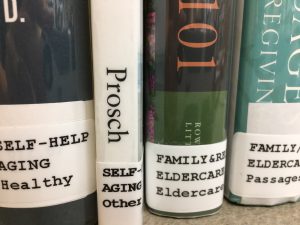Aug
31

Posted by Margot M on August 31st, 2017
Posted in: Patient Engagement
Tags: graphic medicine, public libraries

BISAC categories at Wilbraham Public Library (MA).
This week, I headed to the Wilbraham Public Library (MA) to lead a book discussion based upon the NNLM NER Graphic Medicine Book Club Kits initiative. We were discussing Can’t We Talk About Something More Pleasant? (Chast). I arrived a bit early. I wanted to check in with librarian Mary Bell and director Karen Demers. I’ve lead health-related book discussions at this library for several years. We’ve discussed Your Medical Mind (Groopman and Hartzband), Know Your Chances (Woloshin, Schwartz and Welch), and The Power of Habit (Duhigg). Wilbraham has a nice group of book club attendees. They are never shy about sharing their opinions.
I learned that Wilbraham is ditching the Dewey Decimal System for the Book Industry Standards and Communications (BISAC). I’ve heard the argument for going with this bookstore-type of categorizing system, but I’d never been in a library that was actually doing it. Karen brought me up to the mezzanine so I could grab some books on Aging and Eldercare. Back on the ground floor, I asked Mary for back issues of The New Yorker. I wanted to share samples of Roz Chast’s more familiar work before we launched into a discussion of her graphic novel.
The first attendee walked in with high praise for Can’t We Talk About Something More Pleasant? She told her 50-something son that he should read the book. She was enthusiastic about the format of the story. Like all the attendees, this was her first experience with reading a graphic novel. For those attendees who had not read the book yet*, I selected several pages to demonstrate the power of sharing a story through comics. They quickly understood.
The discussion was a success. Attendees were comfortable with sharing their impressions of Roz Chast and her struggles with her aging parents. Likewise, they shared their own experiences with aging parents and with their own aging. One man said that his family’s story mimicked that of Roz Chast. The photos of her parents’ chaotic apartment were familiar to him. His wife said that their goal was not to put their son through the stress of tossing out decades of their stuff. At the same time, everyone in the room marveled at how easy it is to accumulate stuff.
One attendee wryly told the story of hearing that her son was not comfortable with her driving on the Massachusetts Turnpike. “We’ll come get you,” he told her. She rolled her eyes. Clearly, she still felt competent at driving on the highway.
During the book discussion, I took a few minutes to demonstrate MedlinePlus by pulling up the End of Life Issues Health Topics page. I distributed a few printouts to show the high quality of the information. I searched additional topics to show that MedlinePlus is not a one-trick-pony. We talked about the differences between using MedlinePlus, WebMD, Mayo Clinic, and Google for health information searches. I hope to get back to Wilbraham. Maybe with a Precision Medicine discussion?
*At every library-sponsored book club, there are always people who haven’t read the book!